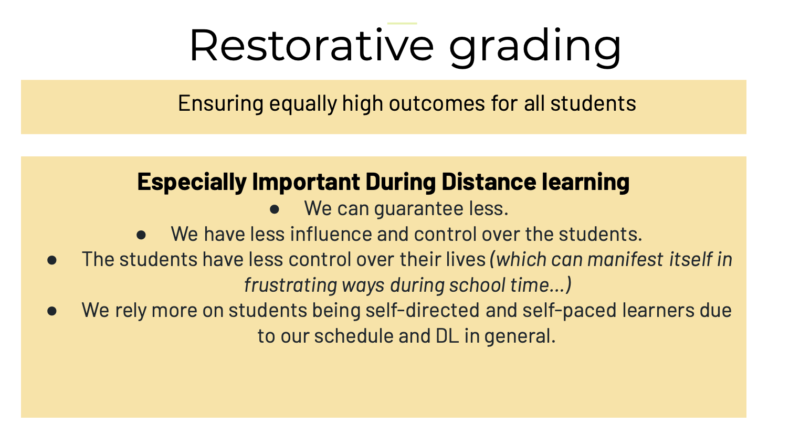Restorative grading helps every student to succeed
This school year has been difficult for many students dealing with all the changes that have happened over the past year. Learning has become much more self-directed and with much less influence from teachers. Challenges like these have caused many students to struggle and grades have dropped. Restorative grading helps to ensure high outcomes for all students in any circumstances.
One policy of restorative grading is a “No Zero” policy meaning that all missing work is given a 50% rather than a zero. Some teachers have already adopted similar policies like always giving at least 30%. Another policy is being able to make up work at any time for full credit.
English teacher Elisa Frozena supports this policy saying “If the work is really worth doing it should be able to be completed after the due date for credit.”
A third policy is not grading students for participation. Many students struggle with anxiety and have difficulty sharing. Other students have WiFi issues or family in the background making participation difficult.
Some wonder if participation is not graded how will teachers get students to participate especially in an online environment. Teacher Emily Ledford says that she “wants to create a safe space where students feel comfortable sharing their ideas” and that she encourages questions whether out loud or in chat. Making a safe space for students to ask questions without stress is crucial to learning.
Most teachers seem to support some form of restorative grading but many do not support the no zero policy. They believe there are other ways to help students but believe the no zero policy sends the wrong message to students.
Social studies teacher Jennifer Sitkin believes in giving students more opportunities to succeed but also in holding students accountable. Sitkin supports practices such as test corrections and making up work to help students actually learn the material.
Economics teacher David Roth-Rossi also does not support the no zero policy. “Kids are smart and will play this system, they will skip assignments they don’t want to do because they know they can still pass with this policy and those are usually the assignments they need the most,” he said. Roth-Rossi wants to see growth with students and believes that showing effort is key.
Both teachers and students seem to support the idea of restorative grading. “I think these policies are beneficial to all students and can be very helpful to those who need extra support especially in times like these,” said junior Leo Chu.
These policies are not only beneficial to students online but also back in the classroom. The struggles that students may face at home don’t go away in a classroom environment which is why many teachers support the idea of using these policies even after things return to normal. These policies apply to everyone including those who may never need them. Restorative grading is meant to help every student succeed no matter their circumstances.

